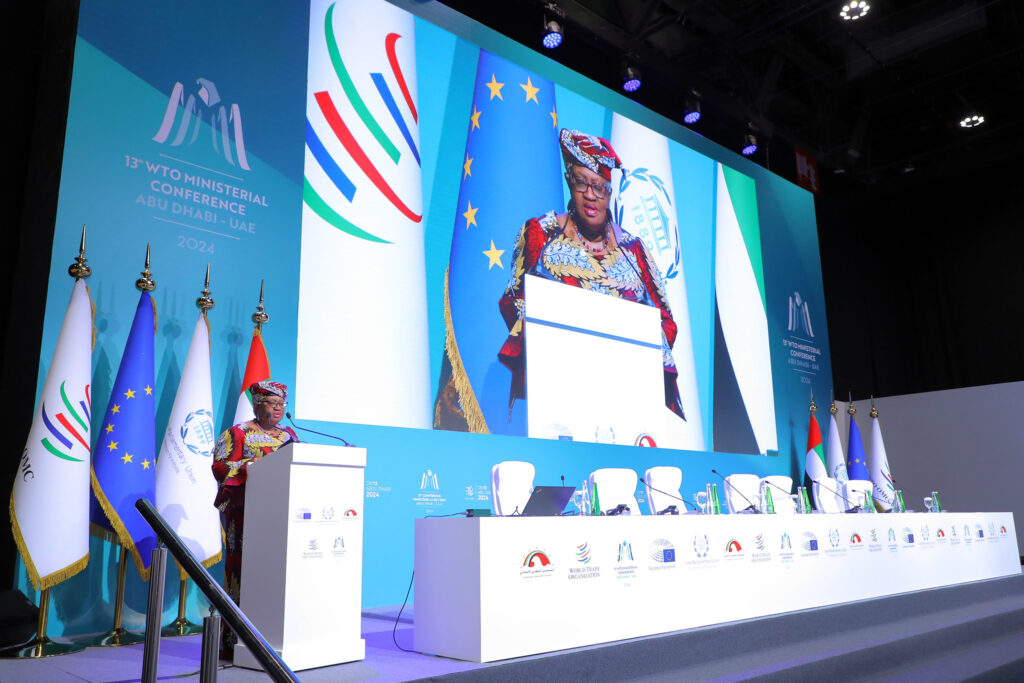Det trettende ministermøtet i Verdens handelsorganisasjon starter i dag i Abu Dhabi. Attac er tilstede sammen med Handelskampanjen, som en del av den norske delegasjonen. Dessverre opplever vi igjen at det er sterke begrensninger på hvem som får slippe til i forhandlingene.

Sivilsamfunn, spesielt fra land i Afrika, Asia og Latin-Amerika, blir stoppet av politiet, nektet visum, hindret i å snakke med journalister og utestengt fra viktige deler av møteområdet.
Dette føyer seg inn i tidligere begrensninger, som når Attac-lederen ble arrestert på grensen på vei til ministermøtet i Argentina i 2017. Sammen med andre sivilsamfunnsorganisasjoner har vi sendt et brev til WTO som protesterer på innskrenkningene.
Åpent brev til WTO-direktøren:
26 February, 2024
Dr. Ngozi Okonjo-Iweala
Director General
World Trade Organization
Dear Dr. Ngozi:
We are civil society representatives accredited to attend the World Trade Organization’s 13th Ministerial Conference writing with serious concerns about our ability to effectively participate in this process.
At other international governance organizations, NGO observers are welcomed into deliberations and permitted to make interventions on the record. The WTO has long fallen short in this regard, but the silencing we have experienced thus far in Abu Dhabi is shocking even by the low bar the WTO has set.
On 25 February, several accredited NGO representatives entered the ADNEC building to distribute information to delegates outside the Investment Facilitation event. But immediately after being permitted through security, they were stopped and searched by local police. Their papers were taken away, they were detained and then escorted off the premises. A separate group distributing a press release was similarly asked to leave.
Another colleague was prevented from entering the conference due to a traditional piece of clothing that was rejected as politically sensitive and potentially affecting the security of the conference, even though the official invitation sent to participants invites them to wear their national dress.
Even before the ministerial, two colleagues from Nigeria were denied visas without explanation.
On 26 February, NGOs were not permitted to attend the opening ceremony. It seems that reporters were held in the restricted area and thus unable to attend our scheduled press event. The imposition of restricted areas has also prevented us from meeting with reporters in the press area and using WTO facilities usually available, such as photocopiers.
We are representatives of people’s movements, small-scale farmers, fisherfolk, union leaders. We have traveled here from Argentina, Australia, Bangladesh, Belgium, Bolivia, Gambia, Germany, Ghana, India, Indonesia, Kenya, Netherlands, Norway, New Zealand, Pakistan, Philippines, Spain, Uganda, and Zimbabwe to speak on behalf of millions of people at this meeting of the world’s largest economic rule-making institution. The communities that will be affected by WTO decisions must be permitted to participate in this process. The WTO talks of inclusivity, yet what we have seen to date suggests our voices will be silenced throughout this ministerial. We expect you, as the Director-General, to ensure there is space for critical voices to be heard in the ministerial itself.
This continues a concerning pattern of suppression on free speech at WTO ministerial conferences. You will be aware of the damage that was caused to the WTO’s credibility when dozens of registered NGOs had their visas rescinded, and others were turned away at the airport at the MC11 in Buenos Aires. At MC12, registered NGOs were harassed by Geneva police and WTO security for simply wearing t-shirts with peaceful messages.
There is a risk that the situation at MC13 will be even more controversial and damaging to the organization’s credibility and to your credibility as the Director-General unless this matter is addressed and resolved now.
Moreover, it is totally unacceptable for the WTO and UAE to invite people to this conference without any clear guidelines of what is going to be permissible. That not only wastes our time and money, but more importantly puts people at significant risk of violating rules they are not forewarned of, with potentially serious personal consequences. While we appreciate that you will be briefing civil society, that is of course not sufficient access and does not address the barriers to participation. The outcomes of MC13 can only address the issues of concern to civil society if we are enabled to engage effectively.
It is the organization’s responsibility in allocating this ministerial to Abu Dhabi to ensure that participants’ rights will be respected. We call on you to address these issues as a matter of urgency.
